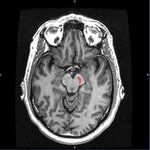Many teens skips breakfast and many teens are obese. The Centers for Disease Control and Prevention (CDC) don't think that is a coincidence, they believe skipping breakfast increases the likelihood of overeating and eventual weight gain. Statistics show that the number of adolescents struggling with obesity, which elevates the risk for chronic health problems, has quadrupled in the past three decades.
A study has found that eating breakfast, particularly meals rich in protein, increases young adults' levels of a brain chemical associated with feelings of reward, which may reduce food…
Neuroscience

Oxytocin, called the "love hormone" because it has been linked to social behaviors like cuddling, maternal care and pair bonding, is also necessary for female social interest during estrus.
A study Cell Press found oxytocin-responsive brain cells that are necessary for female social interest in male mice during estrus, the sexually receptive phase of their cycle. These neurons, found in the prefrontal cortex, may play a role in other oxytocin-related social behaviors such as intimacy, love, and mother-child bonding.
Oxytocin-responsive neurons are found in many brain structures,…
By Ben Locwin, Genetic Literacy Project
The 2014 Nobel Prize in Physiology or Medicine was just awarded to three neuroscientists for refining some past research and developing some pioneering new results to understand how our brains keep track of where we are spatially.
John O’Keefe, a professor of cognitive neuroscience at University College London, May-Britt Moser, and her husband, Edvard Moser, of the Norwegian
University of Science and Technology in Trondheim will share the Nobel Prize.
Have you ever wondered how you (vis-à-vis your brain) know where you are in the course of a…

Who doesn't want more brain power? Credit: James Steidl
By Elizabeth Maratos, University of Leicester
The practice of physically stimulating the brain in order to alleviate symptoms of illness and injury has been around since the early 20th century. For example, electroconvulsive therapy (ECT) is still used to alleviate symptoms of depression.
However, perhaps in part due to negative connotations associated with ECT, in modern medicine treatment of psychological disorders have tended to use other forms of intervention. These now mostly involve drugs or therapy. However, a recent study,…

A new study has pinpointed working memory as a cause of learning difficulties in people with schizophrenia.
Working memory is known to be affected in 1 percent of the population who have schizophrenia, but it has been unclear whether that has a specific role in making learning more difficult, said Brown University postdoctoral researcher Anne Collins, lead author of the paper
in the Journal of Neuroscience.
Collins and Frank collaborated with schizophrenia experts James Waltz and James Gold of the University of Maryland, to measure the effects of working memory and reinforcement in…

Substantia Nigra's dopamine producing cells degrade in Parkinson's disease Credit: Geoff B Hall - Own work. Licensed under Creative Commons via Wikimedia Commons
By Meredith Knight, Genetic Literacy Project
For the last 25 years, using fetal tissue for scientific research has largely fallen out of favor in both the European and U.S. scientific communities. One of the most publicized uses of the controversial technique was a series of trials that transferred dopamine-producing neural tissue from aborted fetuses into the affected brain regions of Parkinson’s disease patients.
The results were a…

Using rats as model subjects, scientists have found that adolescents were at an increased risk of suffering negative health effects from sugar-sweetened beverage consumption.
Adolescent rats that freely consumed large quantities of liquid solutions containing sugar or high-fructose corn syrup (HFCS) in concentrations comparable to popular sugar-sweetened beverages experienced memory problems and brain inflammation, according to a new study. Neither adult rats fed the sugary drinks nor adolescent rats who did not consume sugar had the same issues.
"The brain is especially vulnerable to dietary…

Certain foods can help your brain retain information. Credit: Shutterstock
By Tanya Lawlis, University of Canberra
Exam time is quickly approaching for high school and university students. While study is at the forefront, nutrition is often the furthest thing from students’ minds. However, a healthy diet plays a vital role in attaining optimal academic performance during the rigors and challenges of exam time.
Key foods and their components have been found to enhance cognitive function, improve mental alertness and enable sustained concentration to help students learn and remember the themes…

John O'Keefe , left, and Edvard and May-Britt Moser. Credits: David Bishop, UCL and NTNU
By Luc Henry, Swiss Federal Institute of Technology in Lausanne
The 2014 Nobel Prize in Physiology or Medicine was awarded with one half to John O'Keefe and the other half jointly to May-Britt Moser and Edvard Moser “for their discoveries of cells that constitute a positioning system in the brain”.
The maps humans created, first on paper and then digitally, have had a dramatic impact on the organization of society and its relationship to the world we live in. But to a large extent, we can still walk…

The way neurons are interconnected in the brain is very complicated. This holds especially true for the cells of the hippocampus. It is one of the oldest brain regions and its form resembles a see horse (hippocampus in Latin).
The hippocampus enables us to navigate space securely and to form personal memories. So far, the anatomic knowledge of the networks inside the hippocampus and its connection to the rest of the brain has left scientists guessing which information arrived where and when.
Signals spread through the brain
Accordingly, Dr Martin Pyka and his colleagues from the Mercator…